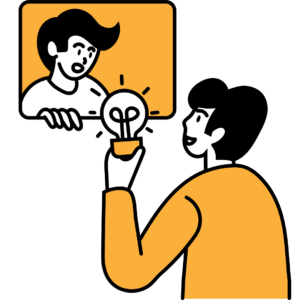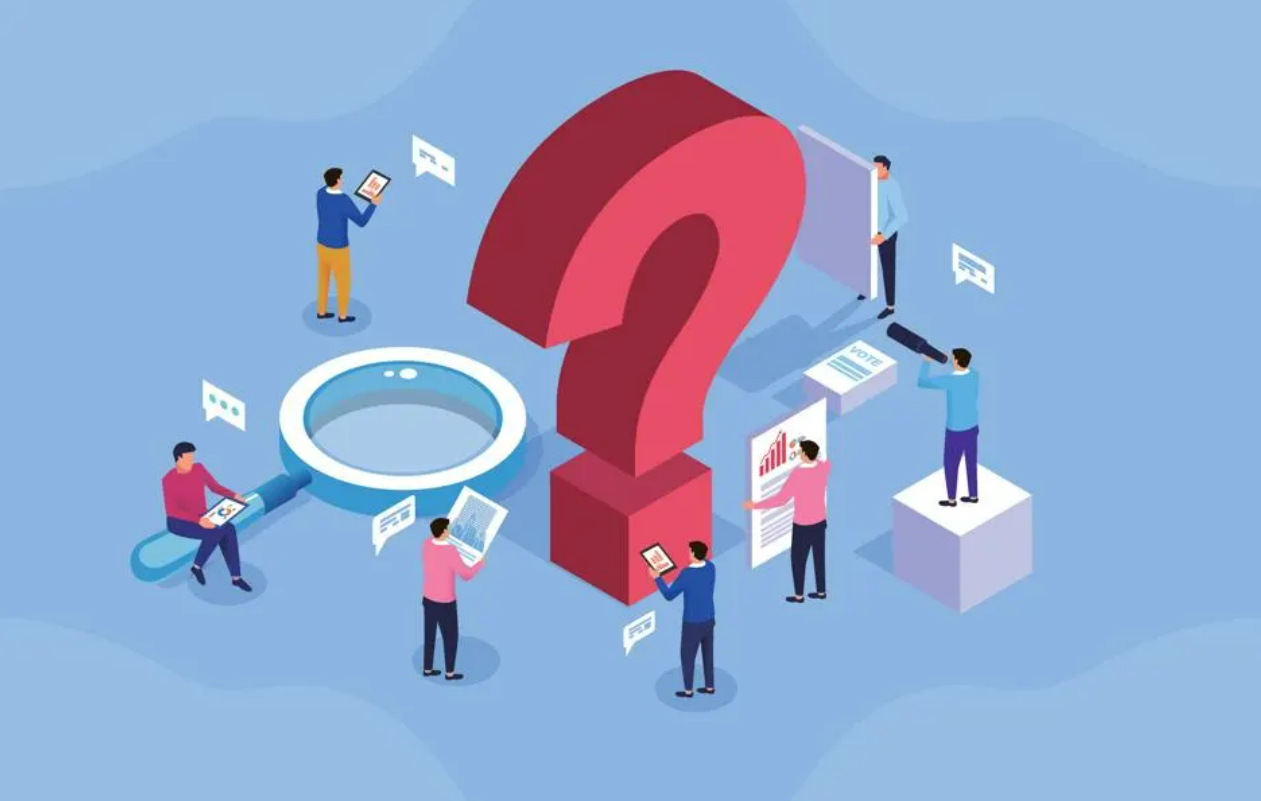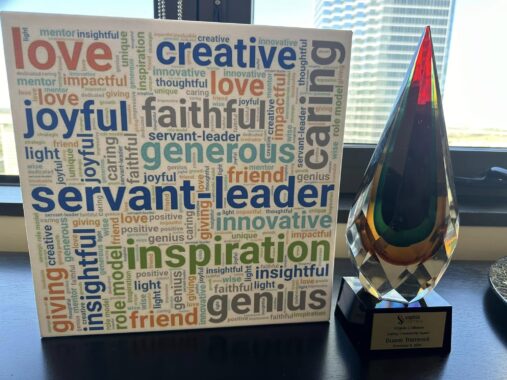Wonder & Curiosity: Unspoken Leadership Skills during Uncertainty
Pressure in the workplace incites varied reactions and preferences.
Does a deadline motivate you to complete a project? Do you prefer the buzz of a busy schedule? Or on the flip side, are you the kind of person who needs more time and space to think and accomplish tasks?
Regardless of where you fall on the pendulum between thriving under high pressure or low pressure, all people need to pace themselves to attain optimal energy and avoid exhaustion.
Robert Greenleaf recognized this and wrote about it in his essay:
“Pacing oneself by appropriate withdrawal is one of the best approaches to making optimal use of one’s resources.”
In this month’s Community of Practice, guest facilitator Caroline Coughlin Lampereur invites you to be thirsty for wonder and hungry for curiosity when you find yourself feeling stuck, under pressure, or disturbed by “lifequakes.”
Time to check in with yourself:
The art of withdrawal, specifically taking time to discern “how best can I serve” – is not about the pace or pressure…it is about intention. Use these two questions for personal reflection:
- What is your best practice for maintaining optimal energy?
- What do you do to withdraw and/or reflect when under pressure?
HARD TRUTH:
Sometimes our inability to withdraw limits our ability to see what is possible, create, and innovate. The ability to innovate is a critical leadership skill.
Nurturing Wonder & Curiosity as Leadership Skills
How do you access wonder and curiosity as leaders?
Oxford Learner’s Dictionary defines wonder as a feeling of surprise and admiration that you have when you see or experience something beautiful, unusual, or unexpected; a desire to be curious to know something.
Merriam-Webster’s Dictionary defines curiosity as a desire or interest leading to inquiry. This motivational desire has been said to stem from a passion or an appetite for knowledge, information, and understanding.
As a leader, becoming an agent of change allows your workplace to thrive, especially in competitive industries. A recent Forbes article says to be an innovative leader, you must be able to demonstrate curiosity.
 This curious or wonder-full (full of wonder!) mindset can have multiple benefits in the workplace, such as:
This curious or wonder-full (full of wonder!) mindset can have multiple benefits in the workplace, such as:
- Curious leaders seek out diverse perspectives and foster cross-department collaboration.
- Employees feel empowered to ask questions, share ideas, and collaborate across departments.
- Curiosity drives a more inclusive and open-minded culture.
Awareness & Disruption
One of the core tenets of servant leadership is self-awareness. Robert Greenleaf said:
“Awareness is not a giver of solace—it is just the opposite. It is a disturber and an awakener.”
Often, there are times in our lives, both personally and professionally, when we feel disturbed or disrupted.
It might be a small disturbance, like when someone says or does something that doesn’t sit quite right with you. Or it could be a big disturbance…when you lose someone, a friend breaks your trust, or you realize that you have been working in a toxic workplace and you feel stuck.
When your life is disrupted, no matter how big or small the disruption, that occurrence can be a step toward awareness.
To help you gain self-awareness, answer these questions:
- Reflecting on your life, who modeled wonder to you?
- Think of a time when you showed up with wonder.
- When in your life did you lead with curiosity?
- What keeps you from being in a space of wonder and curiosity?
When “Lifequakes” Occur
When BIG disruptions or trauma happen in your life, we can describe it as a “lifequake.”
 Gabor Maté with his son Daniel Maté researched and wrote the book, The Myth of Normal, where they defined the word “trauma,” which is a Greek word for “wound.”
Gabor Maté with his son Daniel Maté researched and wrote the book, The Myth of Normal, where they defined the word “trauma,” which is a Greek word for “wound.”
They said that trauma is what happens inside of you as a result of what happened to you. Trauma is not the event that inflicted the wound, rather, it is the wound that you sustained as a result.
How do you access wonder and curiosity to respond positively when these traumas or wounds live inside of you, whether personally or professionally?
Richard Rohr, an author and theologian, gives this perspective into why it is important to find wonder and curiosity during or after a lifequake.
“Pain that is not transformed will be transmitted.” – Richard Rohr
Gabor and Daniel introduce us to the 6 Facets of Trauma:
- Trauma separates us from our bodies.
- Trauma splits us off from our gut feelings.
- Trauma limits our response flexibility.
- Trauma fosters a shame-based view of ourselves.
- Trauma distorts our view of the world.
- Trauma alienates us from the present.
Now, let’s explore using these 6 questions in direct correlation to the 6 facets above as a way to access wonder and curiosity when facing trauma in any circumstances you are in:
- What are the ways I come back into my body?
- What are my ways of feeling my feelings? How do I attune to my feelings?
- What are my ways of being flexible in my responses?
- How do I stay in my integrity and values?
- How do I embrace a wholehearted, hope-filled worldview?
- How do I connect or reconnect to the present moment?
The next time you recognize a disturbance or lifequake in your life, think about a best practice that works for you to access wonder and curiosity in that moment. Maybe that looks like offering a solution to the problem, finding clarity in a tense situation, or collaborating with a trusted friend or mentor before making a decision.
Remember, everyone has a practice that works best for them!
When You Need Support: The Gift of Gratefulness
Watch the “A Grateful Day” video by Br. David Steindl-Rast. This video awakens us to the wonders of our world, reminds us about what truly matters, and invites us to notice the everyday gifts of our lives, even when we as leaders find ourselves feeling stuck, under pressure, or disturbed by lifequakes.
“So you think this is just another day in your life? It’s not just another day. It is the one day that is given to you…today.” -Br. David Steindl-Rast
The next time you find yourself in a place of fear or trauma, we hope this information supports you to move forward as a stronger leader and opens up space within your mind and body to allow wonder and curiosity to flow!
______________________________________________________________________
What have you learned from this blog? Let us know!
Don’t miss your opportunity to join our next conversation! Community of Practice sessions are amazing opportunities for any and all leaders to gather and learn from one another in a supportive, comfortable environment, right from your computer. November’s topic is “Leading with Gratitude.”
Additional Resources:
- 6 Facets of Trauma – Resources
- 6 Facets of Trauma – Worksheet
- Why Curiosity Might Be The Most Underrated Skill In Business
- The Myth of Normal – Gabor Maté, MD with Daniel Maté
- A Grateful Day Video
______________________________________________________________________
This blog post wraps up October 2024’s Community of Practice conversation. To join us during the live discussion for future months, register at https://www.sophiapartners.org/events/. This program occurs the fourth Tuesday of each month from 11:30 a.m.-12:30 p.m. CT via Zoom.



